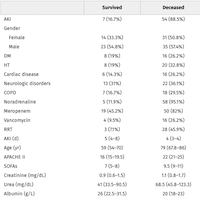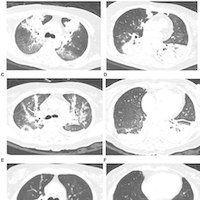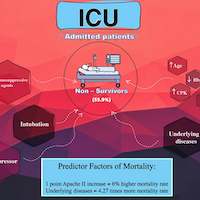Tag: antibiotics

AKI Risk Factors in ICU Patients Using Colistin
Colistin, an antibiotic of polymyxin group, has recently been increasingly used in the treatment of multidrug resistant gram-negative bacteria. However, it has serious adverse effects such as acute kidney injury (AKI). We... read more

Omadacycline Treatment of Severe Pneumonia Complicated with ARDS During COVID-19
Metagenomic next-generation sequencing (mNGS) has a significant value in the diagnosis of Chlamydia psittaci infection. Timely treatment of omadacycline can improve prognosis and provide a promising new option for the treatment... read more

Sepsis Management: PIRO and MODS
This book is unique in approaching multiple organ dysfunction syndrome (MODS) from the perspective of its pathophysiological mechanism, and addressing aspects that are overlooked in most of the available literature. Eminent... read more

Clinical Outcomes in Critically Ill COVID-19 Unvaccinated Patients Admitted to the ICU
We analyzed unvaccinated critically ill ICU patients with COVID-19 and interpreted their demographics, clinical characteristics, comorbidities, and laboratory data upon ICU admission for a better understanding of their impact... read more

Simple Blood Test Indicating Sepsis Relapse
Sepsis is often not adequately diagnosed at the early stage when it could still be potentially avoidable. In this report, we describe the dramatic hematological changes found in the blood of a sepsis survivor just after discharge... read more

Roadblock: AFib with RVR
In this paper we focus on strategies to bypass the most common pitfalls in our treatment algorithm when treating patients who present to the ED in atrial fibrillation with RVR. We all know the few medications in our toolbox... read more

Cluster of Carbapenemase-Producing Carbapenem-Resistant Pseudomonas Aeruginosa Among ICU Patients
Treatment of carbapenemase-producing carbapenem-resistant Pseudomonas aeruginosa (CP-CRPA) infections is challenging because of antibiotic resistance. CP-CRPA infections are highly transmissible in health care settings because... read more

Ground-breaking New AI Technology for Severe Sepsis Rapid Identification
ASEP Medical Holdings Inc. announced the ground-breaking use of artificial intelligence (AI) to rapidly identify infections at increased risk of severe sepsis. The method was developed by the Hancock Lab, under the guidance... read more

Choosing Wisely Interventions to Reduce Antibiotic Overuse
These real-world multicomponent interventions responding to physician pay-for-performance (P4P) incentives were associated with substantial reductions in antibiotic prescriptions for acute respiratory tract infections (ARTIs)... read more

Plasmodium Vivax Presenting with Septic Shock and Disseminated Intravascular Coagulation
Malaria has various causative agents that can have a spectrum of disease manifestations, some potentially fatal. Various species have been established as etiologies of malaria, though our understanding of the severity of... read more

Rapid Sepsis Tests Using Magnetic Nanoparticles
Qun Ren, an Empa researcher, and her team are currently developing a diagnostic procedure that can rapidly detect life-threatening blood poisoning caused by staphylococcus bacteria. Staphylococcal sepsis is fatal in up... read more

Biggest AMR dilemma: to give, or not to give antibiotics?
Sepsis (a dysregulated reaction of the body to infection with 50 million cases per year) must be treated with antibiotics as soon as it is suspected — ideally, within the first hour. Antibiotics are thus easily administered... read more

Effect of ICU Quality Control Indicators on VAP Incidence Rate and Mortality
This study highlights the association between the ICU quality control (QC) factors and ventilator-associated pneumonia (VAP) incidence rate and mortality. The process factors rather than the structural factors need to be... read more

Hospital Acquired Infections, Multidrug Resistant (MDR) Bacteria, Alternative Approaches to Antibiotic Therapy
Bacterial resistance to known and currently used antibiotics represents a growing issue worldwide. It poses a major problem in the treatment of infectious diseases in general and hospital-acquired infections in particular.... read more



